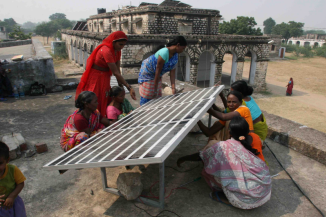Since its inception, the long term objective of the Barefoot College has been to work with marginalized, exploited and impoverished rural poor, living on less than $1 a day, and lift them over the poverty line with dignity and self respect. The dream was to establish a rural college in India that was built by and exclusively for the poor.What the rural, impoverished and marginalized think important is reflected and internalized in the beliefs of the College. The Barefoot College is one of the few places in India where Mahatma Gandhi’s spirit of service and thoughts on sustainability, are still alive and respected.
- A central belief was that the knowledge, skills and wisdom found in villages should be used for its development before getting skills from outside.
The College has applied rural traditional knowledge and skills to build homes for the homeless, collect rain water in rural schools and community where potable water sources are scarce, as well as to spread socio-economic messages at the grassroot level through puppetry. Only technologies that can be understood and controlled by rural community have been introduced to improve the quality of life of the poor.
- A belief that sophisticated technology should be used in rural India, but it should be in the hands and in control of the poor communities so that they are not dependent or exploited.
The Barefoot College has demystified technologies and decentralised their uses by transferring the access, control, management and ownership of sophisticated technologies to rural men and women, who can barely read and write. The College believes that even uneducated poor have the right to use technologies to improve their life and skills.
- A belief that there is a difference between Literacy and Education.
The Barefoot College believes that ‘literacy’ is what one acquires in school, but ‘education’ is what one gains from family, traditions, culture, environment and personal experiences. Both are important for individual growth. At the College, everyone is considered an education resource, the teacher as well as the student and the literate as well as illiterate. Therefore, the Barefoot College is a radical departure from the traditional concept of a ‘college’.
- A belief in the equality of women.
The Barefoot College has struggled to train village women, in areas that have traditionally been dominated by men. Since 1972, more than 6,525 unassuming housewives, mothers & grandmothers, midwives, farmers, daily wage labourers and small shopkeepers, who represent the profile of rural women from poor agricultural communities, have been trained as Barefoot midwives, handpump mechanics, solar engineers, artisans, weavers, balsevika (crèche teachers), parabolic solar cooker engineers, FM radio operators and fabricators, dentist, masons, and day and night school teachers. Women who are single mothers, middle-aged, divorced, physically challenged or illiterate are prioritised for training over others because they need the employment opportunity and income the most.

